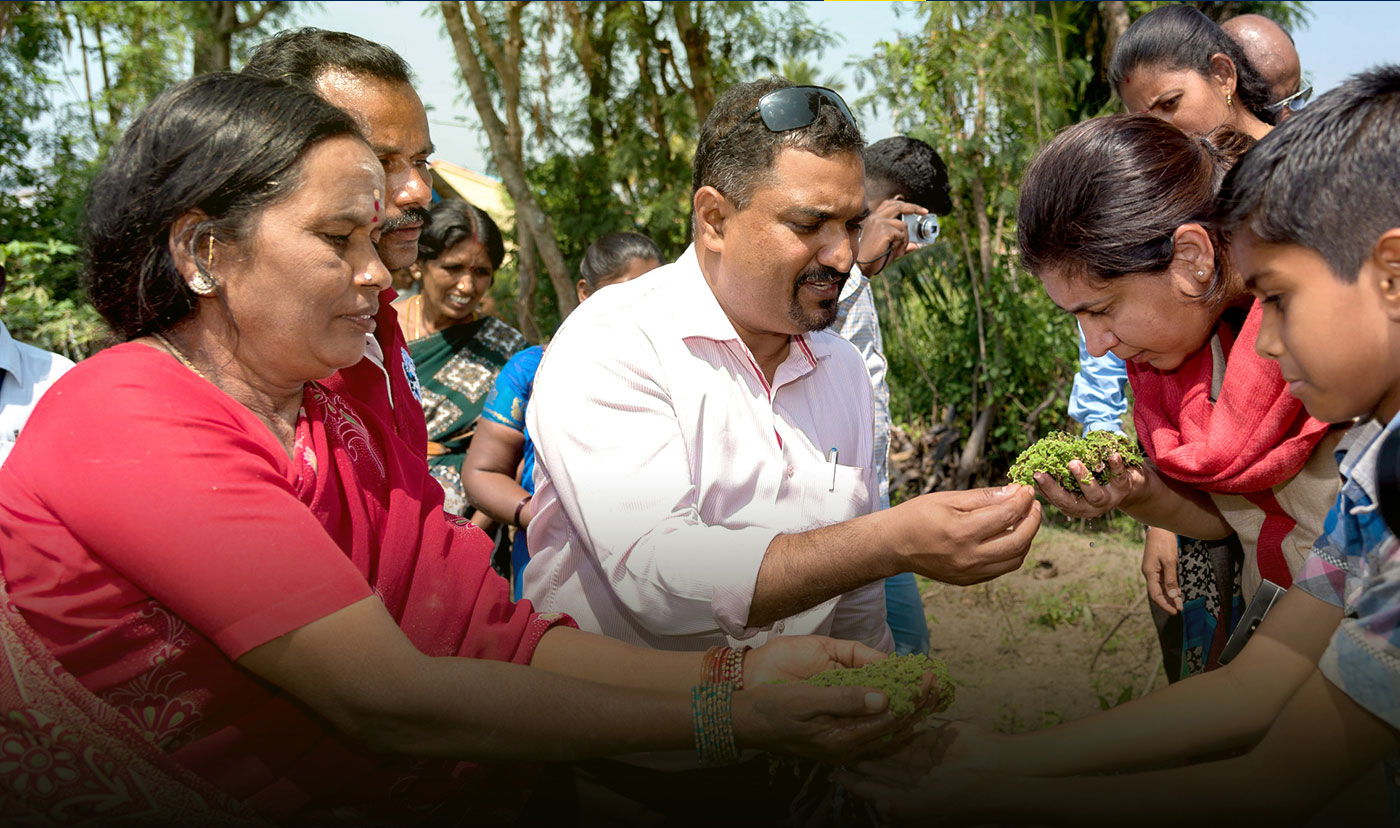
Regenerative Sustainable Development
Caring and healing our planet, for generations to come
Regenerative Sustainable Development
Rapid Urbanization, is one of the key issues faced in India. Lack of infrastructure, lack of economic opportunities, poor schooling and shortage of opportunity is driving population from villages to already bludgeoning cities and towns with crumbling infrastructure. In order to balance this cycle, we believe it is essential to provide strong infrastructure and opportunity in villages to encourage a balance in population spread and spark development across villages.
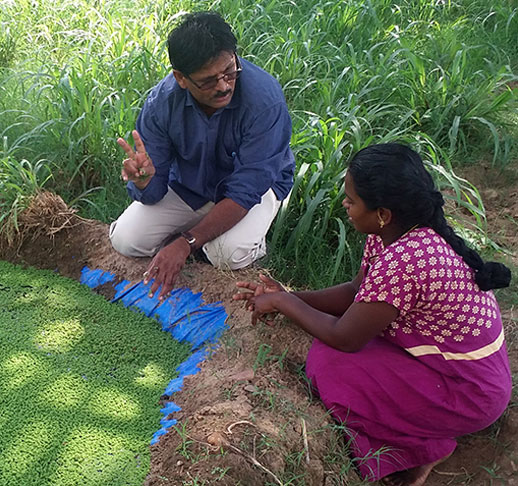
key facts
our programs
Creating intervention models and scholarship pathways in education, vocational and personality development for children and youth.

Village Development Program
Ennegoll Panchayat under district of Krishnagiri has 8 villages under its umbrella and together have a population of over 5,000 people. In 2015 the Faizal and Shabana foundation adopted the villages in the panchayat and introduced a village intervention model (Krishnagiri Development Project) that would create sustainable development, while improving the lives of the villagers. This model is proven successful and we are working to expand it across villages in India.
As part of the Krishnagiri Development Project, the Foundation runs various interventions including a School, Vocational Classes in English and Computer Skills, Tailoring Classes, Organic Farming and introduction of new techniques in cattle rearing. We are also working with the community to create better low-cost housing, sanitary areas and cultural fairs and activities. Our interventions have led to a 225% increase in school enrollment and a 10% increase in farmer incomes and a substantial jump in house hold income, were women are becoming earning members through tailoring and other vocational careers. Over 500 families have been directly impacted through our program
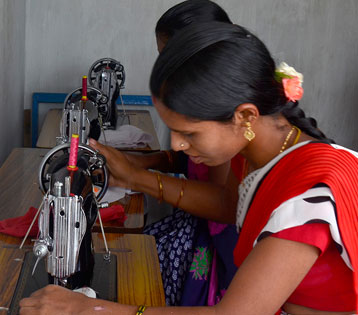
Women Vocational Training
Empowering women through education and vocational training is an important part of what we do at the Foundation. Through our initiative we have encouraged local women from the 8 villages to utilize their skills to support additional income for the family. This has helped not only the women become independent but has also helped them to be an additional source of income for the family. We also encourage women to take leadership roles in our development programs and hire them as local program support staff. In line with this endeavor we also support the Magra village society that provides employment to local women through knitting and vocational training in tailoring and other craft. They also provide computer literacy and Mathematics and English coaching to young learners. The Foundation supports them financially and this has helped them expand on their existing base of vocational courses for women.
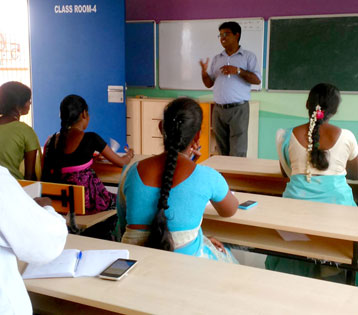
Skill Development Program
Empowering blue collar workers with new skills is very essential this enables them to get better jobs and build better lives for themselves and their families. The construction industry in India is very underdeveloped, workers skills are not developed and the industry still continues to use practices that are hazardous. Through our parent company KEF Holdings that has introduced offsite manufacturing in India we have worked to upskill over 200 workers from the Krishnagiri district enabling to build a better life for them and their families.
The Foundation also supports the BA Industrial Training Institute located in Thumbay which trains people from economically weaker backgrounds in employable trades. The institute has practical labs for welders, Car, Diesel and AC mechanics and Electronics mechanics, ensuring hands-on experience which prepares them for jobs outside. Apart from that, the institute also trains students in spoken English, driving and behavioral skills that will help them gain employability sooner. The Foundation helped set –up infrastructure facilities (labs and classrooms) for the institute and continues to offer yearly support.
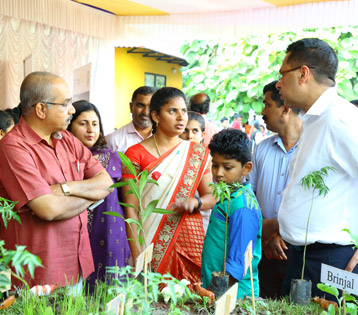
Integrated Farming Systems
The Foundation is working to create an agricultural system model that integrates livestock and crop production including different components of the farming system together including: Field crops, crop production, vegetables, fruit cultivation, poultry farming, livestock integration, agro elements, forestry, bee keeping, mushroom cultivation and a bio-gas plant. This system aims to help poor farmers who have very small land pockets increase their income, improve the quality and quantity of food produced in their farm and in turn improve their quality of life.
Following this practice ensures regular income and year-round employment, provides food and nutritional security, encourages eco-recycling of agriculture residues, by-products and wastes. This process also creates better soil quality for sustainable agriculture, minimization pollution hazards and improving micro climate. It the long run it helps in conservation of natural resources and minimizes the risk of failure in productivity thus benefiting both the farmer and the environment.
testimonials
- Niranjana, School Student, G.V.H.S.S for Girls, Kozhikode India
Faizal Sir and Shabana Ma’am are truly an inspiration and role model to us because we don't find many people who believe in giving back to the society and especially helping us girls create our lives.
Niranjana, School Student, G.V.H.S.S for Girls, Kozhikode India - Jaluse K, Principal & Non-Vocational Teacher, G.V.H.S.S for Girls, Kozhikode, India
"The Faizal and Shabana Foundation has done a fantastic job of improving the school on all levels be it infrastructure, sports facilities, cultural and art programs, teacher training and engagement. The ambience at the school is truly one of positivity, with eager students proud of the changes the foundation has brought about in their lives."
Jaluse K, Principal & Non-Vocational Teacher, G.V.H.S.S for Girls, Kozhikode, India - A. R. Rahman
“The dedication of Faizal and Shabana to the PRISM project to make the Nadakkavu school the first Govt. school to be recognized in the Top 10 schools in India in 5 years’ time is extremely commendable
A. R. Rahman, Oscar & Grammy Award Winning Singer-songwriter, Music Producer, Musician and Philanthropist
- Ronaldinho, Footballer, Brazil
"I have really enjoyed my visit to the GVHSS Nadakkavu School and I am extremely impressed by the facilities the school has to offer. I congratulate the Kerala Government and the Faizal & Shabana Foundation for giving these young talents access to this state-of-the-art football facility, which will help them better hone their skill."
Ronaldinho, Footballer, Brazil
True happiness and joy, comes from creating a positive impact – this philosophy has defined the work Faizal Kottikollon has done as a passionate social entrepreneur.
An ingenious humanitarian he believes in always Giving Back in a manner that is long-term, sustainable and impactful. This thought process is one of the cornerstones of every initiative the Foundation has undertaken including, creating a sustainable school intervention model to reform government education practices in India, and empowering and educating farmers in new practices and techniques. His forward thinking has also played a significant role in enabling the creation of low-cost, yet high-quality basic infrastructure like schools, hospitals and food subsidy canteens in India through the use of technology, and has also helped up-skill construction workers in the country.
Faizal has always looked at his work as a way of creating a positive impact to create a better future. He consistently harnesses the latest technology, believing that it has the largest and fastest impact to help the underprivileged and build a more equitable world for everyone.

Shabana Faizal cares passionately about people, development and community building. Across her over 20-year entrepreneurial and philanthropic journey she has always focused on developing avenues that empower and provide sustainable opportunities for those less privileged. This forms the other cornerstone on which the Foundations programs and activities are visualized.
From providing village women a platform to share their art through her first speciality retail venture in 1995, to creating a one-of-its-kind community development centre for workers in UAE, to helping deserving students and community members to educate and train themselves and find a sustainable livelihood, – Giving Back is intrinsic to Shabana’s value system.
Today under her guidance the Foundation has grown and created a ripple effect that has impacted the lives of thousands of people across the Middle East and India. As she continues to dedicate her time and resources to causes most close to her, she believes that there is a lot more work yet to be done to create an equitable community, and a better tomorrow for everyone.
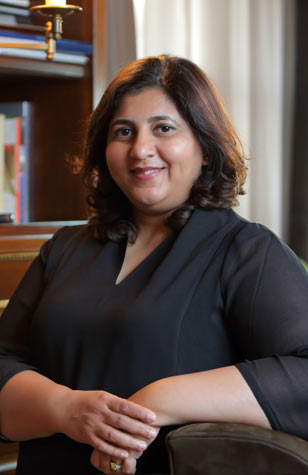
With a PhD in social work to his credit, Dr. Joseph Sebastian has over two and half decades of social development experience. Starting his career as a community development worker, Dr. Sebastian went on to become an academician, a professor and the Principal at Yashawantrao Institute of Social Sciences, Maharashtra. Prior to becoming Head of the Faizal and Shabana Foundation, Dr. Sebastian was the Executive Director of Indo Global Social Service Society. In an earlier role, he has also served as Director-Operations and Director-Monitoring and Evaluations at Project Concern International, a US-based non-profit organization.
Passionate about working with people and impact creating projects, Dr Sebastian brings to his work grass roots as well as board room level through processes. He is at ease working with villagers – young and old; women and men and at the same time sitting at a table formulating policies. He believes that one has to give the most and the best to those in need and any amount one gives may not be enough as there is so much to be done to bring about fullness of life.
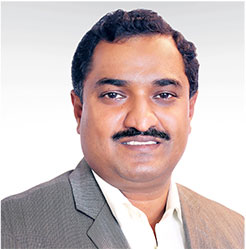
Nimmy Theresa Antony completed her BTech in 2012. Recruited directly from the Campus, she worked with UST Global as software engineer. It’s after working for more than a year, she could take the strong step to follow her passion of working for and with people. She went on to complete her Master’s in Social Work with specialisation in Rural Development from TISS. She has rich experience working with hard to reach communities – economically and socially. Her expertise is in the fields of public health, education, hygiene and women empowerment. Prior to joining to the Foundation, she has worked with CARE India in remote parts of Bihar.

Chelleth Roshan John completed her Masters in Social Work from Nirmala Niketan College, Mumbai in 2004. She has also done a Diploma in MBA and Human Rights Law from National Law School of India University (NLSIU). She has a rich experience working with national welfare organisations like Childline, Vedanta Foundation and Share. Prior to joining the Faizal and Shabana Foundation, she worked with Margdarshak as the Regional Head for CSR in Goa.
